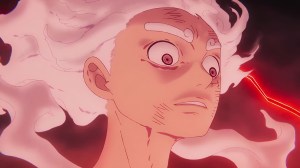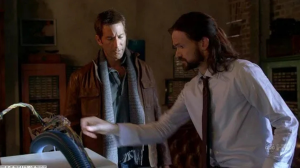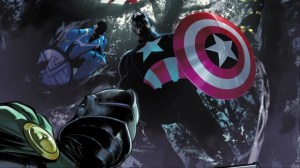
Only two years after the much maligned Jobs biopic, some of Hollywood’s top talent is taking another crack at Apple’s (in)famous CEO Steve Jobs. Director Danny Boyle has teamed with writer Aaron Sorkin to explore the complexities of Jobs as a businessman, inventor, friend, and father. Together they structure and tell the story in a way that manages to avoid many common biopic pitfalls. Steve Jobs always feels and reads like a movie, one filled with its own energy not just that co-opted from reality, even if it does manage to almost undo itself in the final minutes of the film.
Videos by ComicBook.com
Sorkin constructs the film like an Excel spreadsheet, locating Jobs’ life on an X and Y-axis of time and relationships. Steve Jobs is set within three product launches (excluding minimal flashbacks) of the Macintosh in 1984, the NeXT in 1988, and the iMac in 1998. Within each of these moments, Jobs encounters the same set of characters including father figure and mentor John Sculley (Jeff Daniels), friend and engineer extraordinaire Steve Wozniak (Seth Rogen), and his estranged daughter Lisa Brennan-Jobs (played by multiple actresses) and her mother Chrisann Brennan (Katherine Waterston). These people spread across 14 years allow Boyle to construct neat character arcs for both Jobs and the most significant people in his life during these formative years of Apple.
The neatness of this construction borders upon being silly within the context of a biopic. These events and moments all connect so tidily that they are certainly not true to life. They all feel like they are being true to the movie itself though, relating Boyle and Sorkin’s understanding of these people and what their journeys mean. Steve Jobs is based on Walter Isaacson’s biography of the same name. Unlike that book, this movie is only based on reality and is more focused on delivering the best possible viewing experience.
Sorkin’s script helps make the unreality of this compact structure much more easily ignored. His dialogue is as sharp as ever and crackles with energy. All of his trademarks are present with lots of walking and talking, witty asides, and instantaneously brilliant observations. It is a truly inimitable style of writing and makes the seemingly mundane events of a corporate launch and backstage drama feel far more important than they truly are, earning the lush, almost epic, treatment that Boyle brings to the stage. Nothing about the speech in this film reflects how people talk, but it’s exactly how we wish we did.
That dialogue could easily fall flat if given a poor or merely workmanlike performance, but there is not a weak link in this cast. Michael Fassbender has proved himself to be one of the greatest talents in Hollywood year-after-year, and completely assumes the role of Jobs here. The movie rarely leads his side and there is never a moment where he doesn’t feel like the same man throughout the run time. This is even more significant given that the biggest themes and ideas in Steve Jobs are all filtered through his personality and self-reflection (or lack thereof). Jeff Daniels really sells the tragedy of CEO John Sculley’s career as well and provides a great deal of insight in their relationship.
The most invigorating performance in Steve Jobs is that of Kate Winslet as Joanna Hoffman though, Apple’s director of marketing and Jobs’ “work wife”. She is not a major part of Isaacson’s biography, but is omnipresent here, always guiding Jobs through his visitors and preparations for each announcement. She sees him in all of his roles and at both his best and worst. Her role is subtle because she must be a person capable of managing a dramatic egomaniac. Yet all of Winslet’s jokes, comments, and slight gestures land exactly as they should, and when she does allow herself to finally snap it makes for the best scene in the entire film.
Jobs remains the star of the film; he is a flaming ball of gas that sucks people into his orbit, threatening to roast them with his own self-proclaimed magnificence. While his achievements both as Apple’s prodigal son are certainly boasted, both Boyle and Sorkin avoid canonizing the man. This depiction of Jobs is true to Isaacson’s work and very critical of his treatment of others. It is a very rare scene in Steve Jobs when the man could be described as anything even approaching a decent human being.
In fact, every other significant member of the cast is noticeably more likable than Jobs. Even the negligent, flighty depiction of Chrisann Brennan reveals her to be a victim of Jobs powers of reality distortion. He is consistently depicted as cruel, demanding, and completely self-obsessed. Boyle lends some empathy for the man, delving into his understanding of his past and why he believes in what he is doing. This serves to make him understandable, but never a hero.
The question Boyle seems to be answering throughout most of the film is how do we balance the beneficial impact of Jobs as an innovator with him being a complete dick. There’s a balancing act between the revealing of applaudable achievements (e.g. the iMac, the 1984 commercial, the resurrection of Apple) and repugnant personal moments (e.g. abandoning your child, refusing to credit your friend, destroying a mentor). Boyle comes close to discovering an answer, reflecting on the personal cost to Jobs for all of the terror and pain he sows.
Sorkin’s repetitive structure also helps to make this point. Callbacks to music, anecdotes, and art all reveal the aging process and how some have handled it more gracefully than others. A weariness begins to enter the final act of this very excitable film. It seems like the movie is heading towards a denouncement of Jobs as a man, even if it must make an exception to appreciate what he created.
That is, until Boyle decides to ditch this nuanced and critical approach to story and character in the final minutes of the film in favor of sentimentality. The conclusion of Steve Jobs must be discussed to some degree because of how badly it betrays everything that leads up to it. It would be one thing if Jobs’ much more sympathetic portrayal and the reveal of pure, heart warming intentions had been set up in the previous 110 minutes. None of that work is there though, and the final 10 minutes is completely unearned. It’s the sort of reversal that leaves you asking “why?” with no valid response to be found.
Steve Jobs throws off the typical follies of biopics for a great film until it stumbles and falls right at the finish line. It turns a fast-paced rush of a character study into something that confuses and baffles. Most of the film has a messy quality to it, but it is an appealing form of messiness finding its roots in the speed of Sorkin’s dialogue and the manner in which this very talented cast can run through it all. It is Boyle that decides to toss that momentum aside in favor of sentimental pablum. While Steve Jobs remains a well made, enjoyable movie, it throws away any chance at the greatness it was racing towards.
Grade: B








